Trending Now
We have updated our Privacy Policy and Terms of Use for Eurasia Group and its affiliates, including GZERO Media, to clarify the types of data we collect, how we collect it, how we use data and with whom we share data. By using our website you consent to our Terms and Conditions and Privacy Policy, including the transfer of your personal data to the United States from your country of residence, and our use of cookies described in our Cookie Policy.
{{ subpage.title }}
US now at most isolationist stage since WW2, says former UK diplomat
How has America's withdrawal from Afghanistan affected the US-UK "special relationship"? For former UK diplomat Rory Stewart, the hasty pullout without consulting close allies is only the latest example of the US — under first Trump and now Biden — being at the most isolationist stage on foreign military interventions since World War II. "It's a very, very awkward, odd moment. I mean, we, can we rebuild from it, but it's been a very shattering, disappointing moment." Watch his interview with Ian Bremmer on the latest episode of GZERO World.
Watch the episode: Is America Safer Since 9/11?
Former Central Bank Governor Ajmal Ahmady discusses Afghanistan's perilous future
Ian Bremmer speaks to exiled Afghan Central Bank Governor Ajmal Ahmady on his own harrowing escape and the perils that await the very much aid-dependent country's economy now under Taliban control.
Calamitous withdrawal from Afghanistan was a crisis of Biden’s own making
Joe Biden has been looking for a way out of Afghanistan for decades, and regardless of how ugly things get, he's not turning back. After Trump reached a deal with the Taliban in 2020 to end the war, Biden decided to stick with the arrangement, overruling his own generals. Ian Bremmer explains that while he agrees with Biden's decision to get out, he did not foresee the incompetence of the execution. In that sense, the last few weeks have constituted the greatest foreign policy crisis for President Biden to date, and one that was largely self-imposed. Ian looks at four key failures led to this disaster on GZERO World.
Watch the episode: Afghanistan, 2021: Afghan & US military perspectives as the last soldier leaves
- Afghanistan: Four key failures - GZERO Media ›
- Can Biden recover from his Afghanistan debacle? - GZERO Media ›
- Biden's mistakes in Afghanistan were not "dereliction of duty ... ›
- What does a Taliban takeover of Afghanistan actually mean ... ›
- US has set the stage for Afghanistan’s humanitarian disaster, says Hina Khar - GZERO Media ›
Can the Taliban's non-inclusive government lead a diverse country?
Ian Bremmer shares his insights on global politics this week with a look at the Taliban's interim government, Chinese President Xi's efforts to redistribute wealth, and changes Bitcoin will bring to El Salvador.
A week after the US withdrawal, how is Afghanistan in the transition to Taliban rule?
Well, for now we have the transition government. They said it was going to be inclusive. It's all Pashtuns and it's all men. So it is inclusive of Pashtun men that like the Taliban. But of course, that's not the final government. And the real question is, are they going to have ethnic diversity across the country? And does that in any way forestall the likelihood of a civil war? Does it allow them to govern an incredibly diverse and difficult-to-govern country? And of course, I think we should be quite skeptical about that, but at least for now, the likelihood that the Americans or most advanced industrial economies would open diplomatic relations with them and engage with them in a constructive way still seems very, very limited.
Why is China's President Xi trying to redistribute wealth?
Well, inequality in China is growing significantly and there are lots of sort of well-known billionaires and that is creating a little bit more social stress. You know that Jack Ma was of course cut from the knees, but he was someone that was really seen as almost an iconic figure to the people. Chinese citizens would have his photo in their homes. Aren't we supposed to do that with the president or with Mao, right? So Xi Jinping doesn't like that. I will say that, although there's all sorts of reasons to want the Chinese society to be more equitable economically, there's also been a lot of decisions recently in China that have undermined the private sector. Xi Jinping seems skeptical of it. And a number of things for political stability that are being done without concern for economic consequences. And of course, to the extent that that continues with the private sector driving most of China's efficiency and growth, they're going to be in more significant trouble, especially including when you look at their indebtedness and their demographics. So I'm a little worried.
What changes will Bitcoin bring to El Salvador?
Let's see if it works. The rollout, the app has been like shut down twice. And the President of El Salvador, Bukele has been like kind of tweeting all the way through, like very hands-on saying, "Okay, restart the app and let's make this work." And I know he's bought Bitcoin, though it's worth less now because one thing that's going to hurt Bitcoin's value is if a country tries to roll out the currency, it doesn't work. So we'll see where it goes. I mean, it's an interesting experiment. I certainly believe there is a future for crypto. Whether there is a future for Bitcoin as the national currency of El Salvador? Let's wait and see on that.
Story of an escape from Afghanistan; "I wasn't supposed to be on that plane” - Ahmady
When Ajmal Ahmady saw the Taliban were about to take over Afghanistan, he knew it was time to get out — fast. The former central bank chief was lucky enough to board a flight, unlike so many of his fellow Afghans desperate to flee. "I was not supposed to be on that plane," Ahmady tells Ian Bremmer about his harrowing escape on this episode of GZERO World.
Watch the episode: Afghanistan, 2021: Three perspectives on the brutal close of a 20-year war
Afghanistan, 2021: Afghan & US military perspectives as the last soldier leaves
Two decades of war in Afghanistan came to a tragic close on August 31 as President Joe Biden announced from the White House that the last US troops had left the country. "I was not going to extend this forever war," Biden said, "and I was not extending a forever exit." On GZERO World, we hear from three people whose lives have been forever changed by the conflict. First, a women's education activist hiding from the Taliban inside Afghanistan, moving every night for her own safety. Then, the former Afghan Central Bank governor, now in exile who barely made it out (and lost a shoe in the process). And finally, a former US Army Captain and CIA intelligence officer whose life was saved by his Afghan interpreter and who is now in a desperate race to help Afghans and their families get out of the country.
Biden's mistakes in Afghanistan were not "dereliction of duty"
In his latest Washington Post op-ed, Marc Thiessen makes strong statements about how and why the Taliban came to take control of Kabul. There have been big mistakes in executing this exit. But "dereliction of duty?" Not in our view. Ian Bremmer and Eurasia Group analyst Charles Dunst explain why in this edition of The Red Pen.
Today we're taking our Red Pen to a recent op-ed from the Washington Post written by Marc Thiessen, a Post columnist, American Enterprise Institute fellow, and former speechwriter for President George W. Bush. It's titled, "Greenlighting the Taliban's takeover of Kabul is a national disgrace," and makes some strong statements about how and why the Taliban came to take control of Afghanistan's capital city. I want to unpack some of his arguments for you and explain why we disagree. So, let's get out the Red Pen.
First, Thiessen argues that "all the horrors the world witnessed over the past two weeks…might have been prevented" had the United States opted to take over Kabul, rather than letting the Taliban do so.
Let's remember: "The enemy gets a vote." Thiessen is comparing the real world, with all of its unpredictability, to a counterfactual one where everything goes according to (his) plan. Even if the horrors he cited had been averted, wouldn't others have unfolded? Putting thousands of Americans back on Kabul's streets would have meant putting them in the crosshairs of terrorist groups like ISIS-K. Do we believe these groups wouldn't have targeted Americans in Kabul with suicide bombings, like the recent airport attack, or even engage them in firefights? Biden had to decide between two unpalatable options. He chose the one he believed would put the fewest Americans in harm's way.
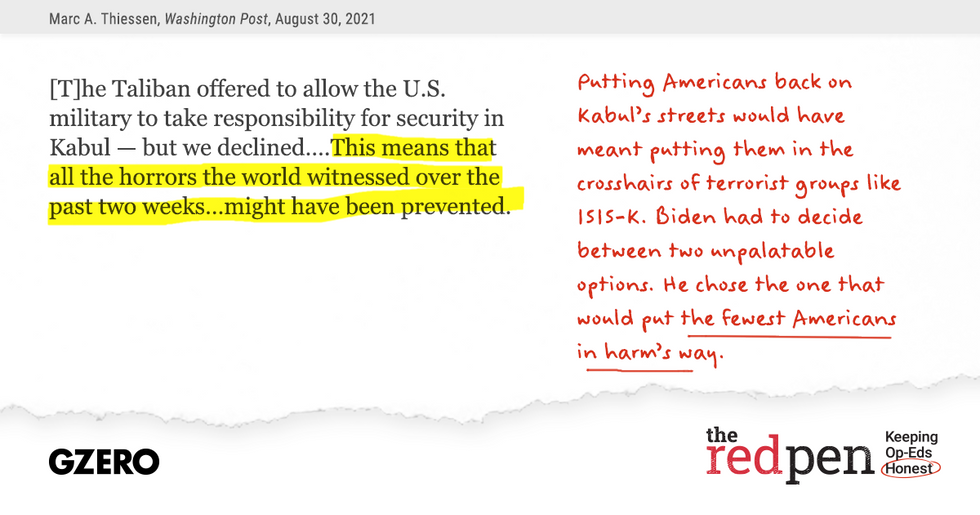
Next, Thiessen cites a former American senior general officer to argue that the "US military could definitely have secured the capital"––at least the green zone where Western embassies are located, plus access to the airport.
For starters, Thiessen bases his argument on the views of one "former senior general officer" whose identity we don't know. How widely shared are those views among current military officials? If the 20-year war has taught us anything, it should be some caution before arguing the United States could secure a city of over six million people indefinitely with a few thousand troops. Before leaving office, the Trump administration brought US troop numbers in Afghanistan to just 2,500, a 19-year low. By the end of July 2021, only 650 remained. Taking over Kabul would've required something politically incredibly challenging: a substantial troop surge that would've put more Americans in danger. Thiessen doesn't explicitly call for a surge, but the upshot of his critique is clear enough. There's an argument for a surge (even if politically very unpopular), he should tell us how many additional troops we would have to send in and for how long to hold onto a city the United States had already lost.
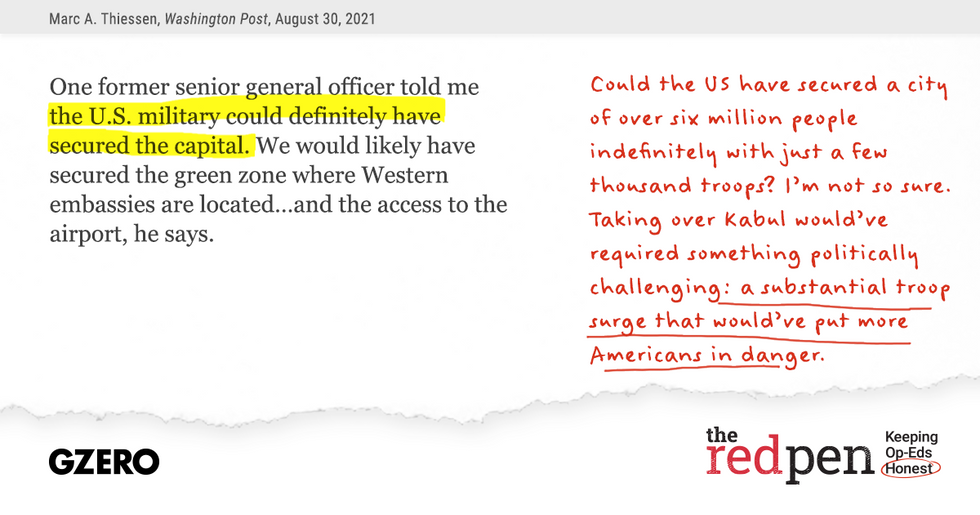
Thiessen also calls the Biden administration's decision to "cede" Kabul to the Taliban "a dereliction of duty unlike any we have seen in modern times."
Keep in mind it was Trump, not Biden, who went over the Afghan government's head back in February 2020 to negotiate with the Taliban and agree to remove all US troops from the country. There were US political considerations for doing so, I get it. But from that point, the Taliban's takeover of Kabul had, at that point, become a foregone conclusion
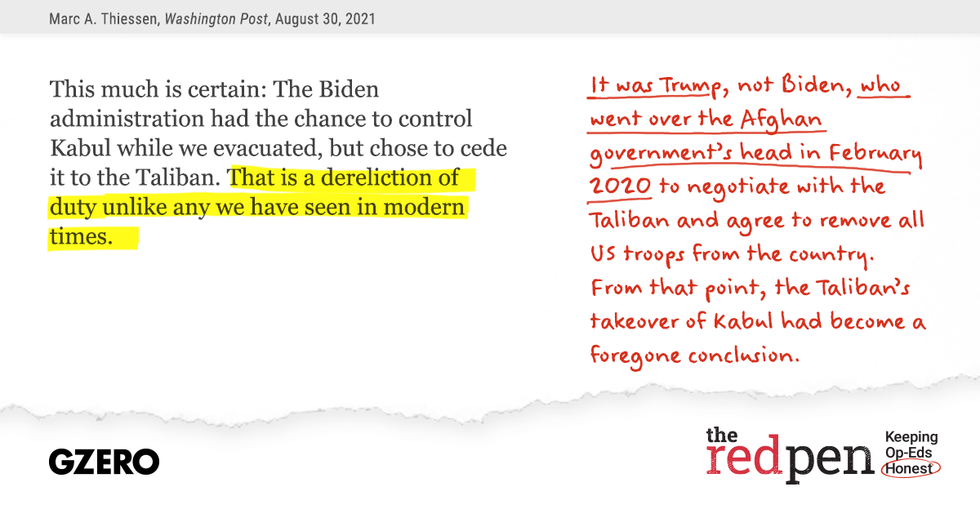
Next point: Thiessen writes that the administration's withdrawal "put the safety of American civilians, service members and Afghan allies in the hands of terrorists" — referring to the Taliban — "rather than the U.S. armed forces" and "led directly to the deaths of 13 Americans in an Islamic State attack on the Kabul airport."
Earlier, though, he almost presents the Taliban as an organization whose word General McKenzie should've trusted: "[T]he Taliban offered to allow the US military to take responsibility for security in Kabul — but we declined." What makes him believe a terrorist organization intent on retaking power would honor a pledge to allow US forces to secure the capital city? Which Taliban is it?
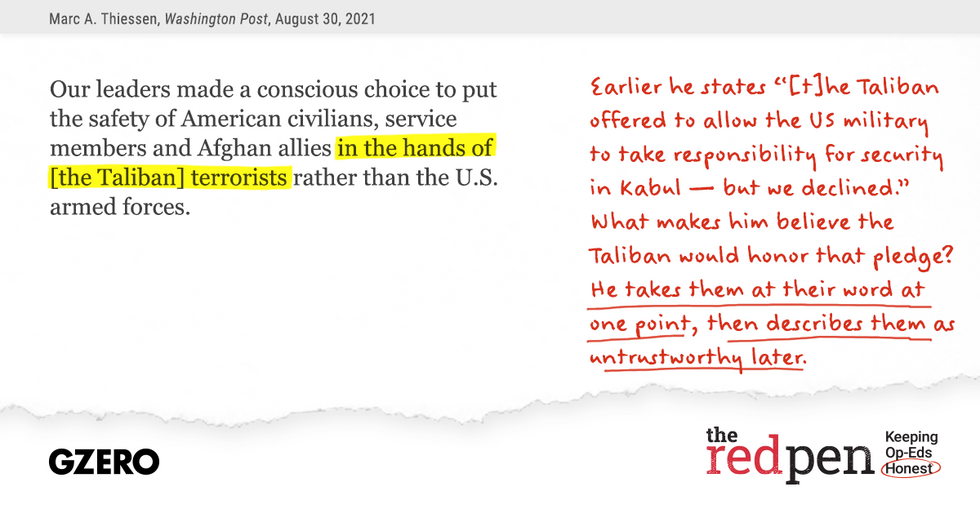
Finally, Thiessen concludes by arguing that Biden's decision to let the Taliban take over Kabul "led directly to the deaths of 13 Americans in an Islamic State attack on the Kabul airport."
Harrowing as the images coming out of Afghanistan are, Biden had decided to not risk even more US lives in the war's twilight. Staying at the airport and trying to hold onto Kabul for a few more weeks would have helped the United States evacuate more Afghan partners, but it would also have risked the lives of thousands of US soldiers.
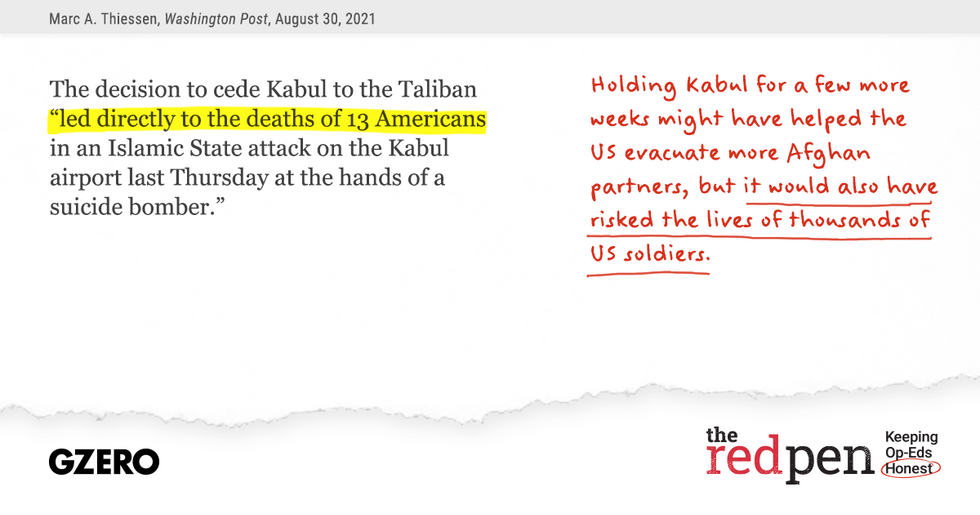
One thing I think many of us agree on — this has been a sad and embarrassing ending to the 20-year war in Afghanistan. We've left countless Afghan allies behind, despite promising them safe passage. August's events will no doubt cast an added shadow of grief over the coming anniversary of the 9/11 attacks. The Biden team certainly made mistakes in executing this exit. But "dereliction of duty?" No, not in my view.
- Afghanistan: Four key failures - GZERO Media ›
- Can Biden recover from his Afghanistan debacle? - GZERO Media ›
- The US couldn't have won in Afghanistan - but Biden's mistakes lost ... ›
- Biden's speech on Afghanistan ignores serious failures; Afghan ... ›
- Calamitous withdrawal from Afghanistan was a crisis of Biden’s own making - GZERO Media ›
Taliban, Afghan people face economic collapse, says former central bank chief
With Afghanistan's US-held assets and most foreign aid frozen, the currency in freefall, bank cash withdrawals limited and food prices surging, former Afghan central bank chief Ajmal Ahmady says the Taliban could soon run out of money to run the country. When that happens, they'll have to cut services, so "the Afghan people are undeniably going to be hurt."
Watch his interview with Ian Bremmer on a new episode of GZERO World, airing on US public television starting Friday, September 3. Check local listings.







